Table of Contents
Home / Blog / Web Development
How To Hire PHP Developers: A Complete Guide
May 29, 2025

May 29, 2025
PHP is still popular in web development, and a large percentage of websites throughout the world are driven by it. As of May 2025, PHP is utilized by 74.2% of all websites whose server-side programming language is known, showing its relevance in the digital world. This widespread adoption is a testament to PHP’s robustness and highlights the sustained demand for skilled PHP developers. In fact, job market trends indicate a significant increase in searches for PHP-related roles, with terms like “PHP Developer” and “Full Stack PHP Developer” experiencing notable growth in popularity.
Choosing to hire PHP developer expertise can prove to be a strategic decision for businesses that want to develop and/or enhance dynamic and scalable web applications. In this guide, we’ll tell you everything you need to know about when to use PHP, the role of PHP programmers and practical steps to take when hiring the right talent for your project.
Hire PHP Developers Who Actually Understand Your Needs
We listen, we build, we deliver. Our devs work closely with you to make sure your vision comes to life.
What Is PHP Used For?
PHP is a widely used server-side scripting language designed specifically for web development. It powers a significant portion of the internet, including content management systems, e-commerce platforms, and custom web applications.
PHP is particularly effective for building dynamic websites that interact with databases and user inputs. From automating backend processes to managing sessions and authentication, PHP remains a practical choice for businesses and developers due to its reliability and widespread support.
What Is a PHP Developer?
PHP developer is a software engineer specializing in developing web applications with the help of PHP code to create server-side logic, database connectivity, and user-facing functionalities for different platforms, websites, social media applications, and more. They are frequently paired with front-end developers and UX/UI designers as part of a larger team working on digital solutions for organizations or clients. They’re not only coders, but also trouble-shooters, speed-optimizers, and overall performance-conscious professionals who ensure that the backend of a site or application runs efficiently and securely.
Explore More: PHP Web Development Services
Why Hire PHP Developers?
1. Cost-effective and Open-Source
PHP is free to use and does not require expensive licensing fees, making it an affordable choice for small to large-scale projects. Its open-source nature encourages innovation and allows developers to customize it according to specific project needs without incurring additional costs. This makes PHP progressive web development highly cost-efficient compared to proprietary platforms.
2. Large Community and Resources
The global PHP community is robust and active, continuously contributing to its development and support. From documentation to plugins and troubleshooting forums, PHP offers an extensive resource ecosystem. This vibrant support network ensures quicker issue resolution and access to the latest development trends, keeping your projects aligned with modern standards.
3. Dynamic and Scalable Web Applications
Hiring PHP developers who are skilled means you can build applications that grow with your business. PHP has rapid web application development tools that support easy scaling, allowing your digital solution to expand in complexity or traffic without a complete rebuild. Whether you’re building an MVP or a robust enterprise system, PHP adapts and performs under pressure.
4. Versatility and Flexibility
PHP integrates well with various operating systems, web servers, and platforms, offering excellent compatibility. Its support for multiple frameworks, APIs, and database types makes it suitable for everything from simple blogs to complex web portals. This flexibility ensures PHP can be molded to meet evolving project demands.
5. Major Platforms and Legacy Systems
Many legacy systems and popular platforms like WordPress, Joomla, and Drupal are built on PHP. This compatibility makes PHP developers invaluable for maintaining and upgrading older systems or integrating with widely-used CMS platforms. Their expertise ensures smooth transitions and consistent system performance.
Qualities to Look for in a PHP Developer
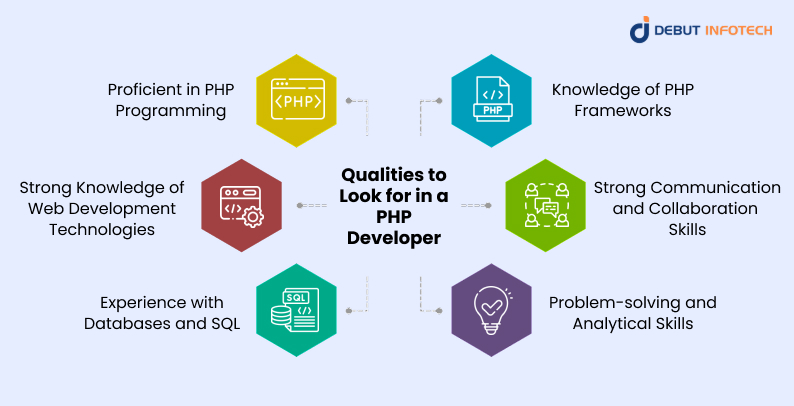
1. Proficient in PHP Programming
A competent PHP developer must demonstrate fluency in core PHP syntax, functions, and best practices. This includes the ability to write clean, maintainable code and follow standards such as PSR (PHP Standards Recommendations). A strong foundation ensures the developer can efficiently tackle various programming tasks and troubleshoot performance issues.
2. Strong Knowledge of Web Development Technologies
Beyond PHP, a skilled developer should be well-versed in front-end languages like HTML, CSS, and JavaScript. Familiarity with AJAX, RESTful APIs, and client-server architecture adds significant value. These cross-functional abilities enable seamless collaboration and better integration between front-end and back-end development workflows.
3. Experience with Databases and SQL
Database interaction is central to dynamic applications, and a good PHP developer for hire must be adept at writing and optimizing SQL queries, managing relational databases like MySQL or PostgreSQL, and ensuring data security. Their ability to design efficient schemas and handle large datasets is crucial for performance and scalability in ecommerce website development.
4. Knowledge of PHP Frameworks
Frameworks such as Laravel, Symfony, and CodeIgniter streamline development by promoting modular code, faster deployment, and better maintainability. Familiarity with one or more of these frameworks enhances a developer’s productivity. It indicates adherence to modern development practices and tools.
5. Strong Communication and Collaboration Skills
Effective, dedicated PHP developers can clearly communicate technical concepts to non-technical stakeholders and collaborate efficiently within cross-functional teams. Good interpersonal skills help ensure the development process is transparent, feedback loops are functional, and project goals are consistently met.
6. Problem-solving and Analytical Skills
Top-tier dedicated software development team are not just coders—they’re problem-solvers. The ability to analyze requirements, foresee potential roadblocks, and devise scalable solutions sets great developers apart. Whether it’s debugging a complex issue or optimizing a slow query, analytical thinking leads to smarter and more sustainable development outcomes.
Related Read: Best Websites to Hire Web Developers
Where to Find and Hire PHP Developers
1. Freelancers
Freelance PHP developers can be sourced through platforms like Upwork, Freelancer, Toptal, and Fiverr. These platforms offer diverse talent pools ranging from junior coders to expert backend specialists. You can browse portfolios, verify ratings, and review client feedback to ensure alignment with your technical requirements.
Hiring PHP developers who are freelancing provides flexibility—ideal for short-term or one-off projects. However, it’s important to set clear expectations, define timelines, and use structured contracts. Managing quality, communication, and consistency becomes crucial when working with individuals on different schedules and in various time zones.
2. In-House Hiring
When you hire dedicated remote developers in-house, you gain full control over the development process and ensure better team collaboration. You can source candidates through job boards like Indeed or LinkedIn, or attend tech meetups and university job fairs. This option is ideal for long-term projects, where constant communication and team integration are essential.
An in-house team can adapt quickly to evolving requirements and maintain continuity. Although this approach may involve higher costs—salaries, benefits, and workspace—it supports better quality assurance and faster decision-making, making it highly effective for complex or ongoing mobile app development.
3. Project Outsourcing
Outsourcing PHP projects to a specialized custom software development agency can significantly reduce internal workload. Agencies offer teams that cover all aspects—from frontend integration to database optimization and QA testing. This option is beneficial for startups or enterprises that lack the internal capacity to manage development.
The agency usually assigns project managers, ensuring streamlined communication and timely delivery. While outsourcing may appear costly upfront, it provides long-term value through structured methodologies, quality control, and scalability. Choose an offshore php developer vendor with proven experience, transparent communication practices, and a portfolio aligned with your industry needs.
How to Hire PHP Developers
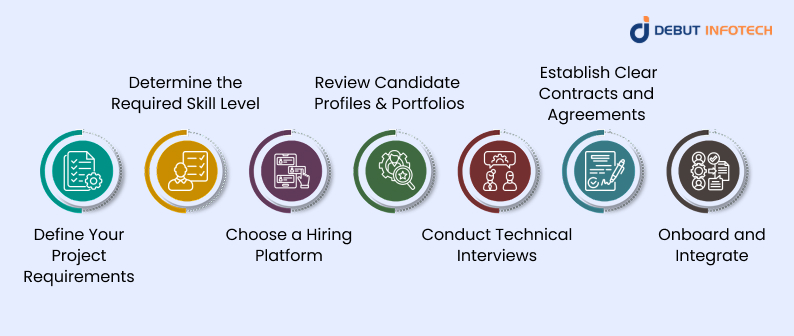
1. Define Your Project Requirements
When you want to hire a dedicated PHP developer, start by clearly outlining your project’s functional and technical requirements, such as expected features, architecture preferences, and deadlines.
Identify whether you’re developing an e-commerce platform, CRM system, or custom CMS. Well-documented requirements help narrow down the kind of PHP expertise you need—whether core PHP or framework-based development. This also assists in estimating timelines and budgeting more accurately.
Additionally, specifying project goals helps candidates assess whether their skills align with your expectations. A detailed brief can also minimize scope creep and align all stakeholders on objectives, deliverables, and success benchmarks right from the start.
2. Determine the Required Skill Level
Decide whether your project needs a junior, mid-level, or senior PHP web developer. Junior developers are suitable for basic coding, bug fixes, and routine maintenance. At the same time, mid-level candidates can manage modules and integrations with minimal oversight.
Senior developers are ideal for large-scale architecture, legacy code upgrades, and high-stakes performance tuning. Skill levels also affect timelines and cost, so be realistic about what’s needed.
Also, consider the long-term roadmap of the project: When you hire php coders with a wealth of experience upfront, this can lead to better code structure, fewer bugs, and a smoother development cycle overall.
3. Choose a Hiring Platform
Selecting the right hiring platform determines the quality and availability of candidates. Freelance platforms provide flexibility, while job boards like Stack Overflow Jobs or Indeed offer access to permanent hires. For curated technical talent, consider Toptal or Gun.io. GitHub and developer forums also help identify professionals who are active in open-source communities.
Agencies can also be effective if you’re looking to outsource an entire project. Your selection should align with your hiring goals—be it full-time engagement, contract work, or consulting—while considering factors like speed of hiring, vetting procedures, and platform reliability.
4. Review Candidate Profiles and Portfolios
Once you identify potential candidates, examine their CVs, portfolios, and repositories closely. Look for real-world project experience, especially those similar in scope to your needs. GitHub activity, code samples, and contributions to PHP libraries can reveal the candidate’s coding style, documentation habits, and familiarity with tools.
Also, check for problem-solving examples or case studies in past work. Read testimonials or client reviews if available. A comprehensive review of each developer’s background not only verifies their claims but also indicates whether their work style and technical strengths align with your project objectives.
5. Conduct Technical Interviews
Before you decide on php developers to hire, conduct technical interviews that go beyond theoretical questions. Include live coding sessions, debugging exercises, and scenario-based challenges relevant to your project. Evaluate how the candidate approaches logic, code structure, and real-time problem-solving.
Ask about past experiences with specific PHP frameworks, deployment strategies, or integrating APIs. For senior roles, you might test system design skills or understanding of security practices. Use tools like HackerRank or Codility to structure your assessments. This hands-on approach helps ensure the developer can not only talk about concepts but also apply them effectively in practice.
6. Establish Clear Contracts and Agreements
Before starting work with a PHP programmer, draft and sign a detailed contract that includes timelines, deliverables, payment schedules, intellectual property rights, and confidentiality clauses. Clarify ownership of the codebase and terms of termination.
For freelancers or outsourced partners, include a clause on dispute resolution and data protection. Contracts protect both parties, ensure legal compliance, and reduce the risk of misunderstandings. Having these formal agreements in place fosters a sense of professionalism and commitment. Using platforms like DocuSign or HelloSign can help formalize the process while maintaining a clear digital record for future reference.
7. Onboard and Integrate
Once you hire PHP programmer India, help them get up to speed quickly by sharing access credentials, code repositories, style guides, and relevant documentation. Set them up on project management and communication tools such as Jira, Slack, or Asana.
Schedule onboarding meetings to introduce them to team members and clarify their responsibilities. Encourage early feedback to identify gaps or misunderstandings. A structured onboarding process boosts early productivity and fosters collaboration, accountability, and long-term engagement. Investing time in this step ensures smoother execution and better alignment with your project goals.
Read Also: Top 10 PHP Development Companies
What Is the Cost of Hiring a PHP Developer?
The cost to hire offshore php developers varies significantly based on several factors, including geography, skill level, and project complexity. On average, freelance rates range from \$15 to \$100+ per hour. At the same time, full-time developers may command annual salaries between \$45,000 and \$120,000, depending on experience and location. Understanding the budget required helps plan development cycles more effectively.
Factors Affecting the Cost of Hire PHP Developers
1. Project Scope and Complexity
Larger, more sophisticated projects require advanced expertise, time, and technical depth—factors that naturally raise development costs. Simple websites with minimal backend functions are more budget-friendly. At the same time, custom platforms with API integrations, dashboards, and security features demand higher investment.
2. Location
Developer rates fluctuate depending on geographic region. For example, PHP developers in North America and Western Europe typically charge higher rates compared to those in Asia or Eastern Europe. Remote hiring offers flexibility to optimize costs without compromising on quality.
3. Level of Experience: Junior, Mid-Level, and Senior
Junior developers are suitable for basic tasks and cost less, while mid-level professionals bring balanced experience and reliability. Senior developers, although more expensive, offer architectural insights, leadership, and deep expertise that can elevate the entire project’s quality and sustainability.
Your PHP Project Deserves the Best—We Deliver
Skip the guesswork. Our seasoned PHP developers bring years of experience to make your site run smoothly and fast.
Conclusion
Hiring a capable PHP developer isn’t just about filling a role—it’s about ensuring your project is delivered with stability, performance, and future scalability in mind. From defining the scope and choosing the right platform to conducting effective interviews and setting clear expectations, every step is crucial in finding a reliable partner. Whether you prefer freelancers, in-house professionals, or outsourced teams, the right match is out there if you follow a clear, informed hiring strategy.
As PHP continues to be essential in powering digital platforms globally, the value of experienced developers remains high. When you set a strong foundation, align technical goals, and prioritize communication and quality, your investment pays off long after launch. Use this guide as your blueprint to hire PHP developer talent with clarity, direction, and confidence.
FAQs
It usually costs anywhere from \$25 to \$150 an hour, depending on where they’re based and how experienced they are. Full-time hires can run between $50,000 and $120,000 annually. Freelancers or part-timers cost less but vary based on the project scope.
Yes, PHP developers are still needed, especially for maintaining older sites and building budget-friendly web apps. It’s not the hottest language anymore. However, there’s steady demand in small to mid-size businesses and agencies that rely on WordPress, Laravel, or existing PHP-based platforms.
Rates vary, but most PHP developers charge between \$30 and \$100 an hour. Junior freelancers may go as low as \$20, while senior devs or specialists can charge \$100+. Location and project complexity also play a big role in the final rate.
Try platforms like Upwork, Toptal, Freelancer, or even LinkedIn. You can also post on job boards like Stack Overflow or reach out through dev communities. Make sure to check their portfolio and reviews—good PHP devs usually have solid real-world work to show.
They should know PHP inside-out, plus HTML, CSS, JavaScript, and SQL. Familiarity with frameworks like Laravel or Symfony helps a lot. Also, version control (like Git), basic debugging, and understanding how servers work are must-haves. Soft skills like communication don’t hurt either.
Our Latest Insights
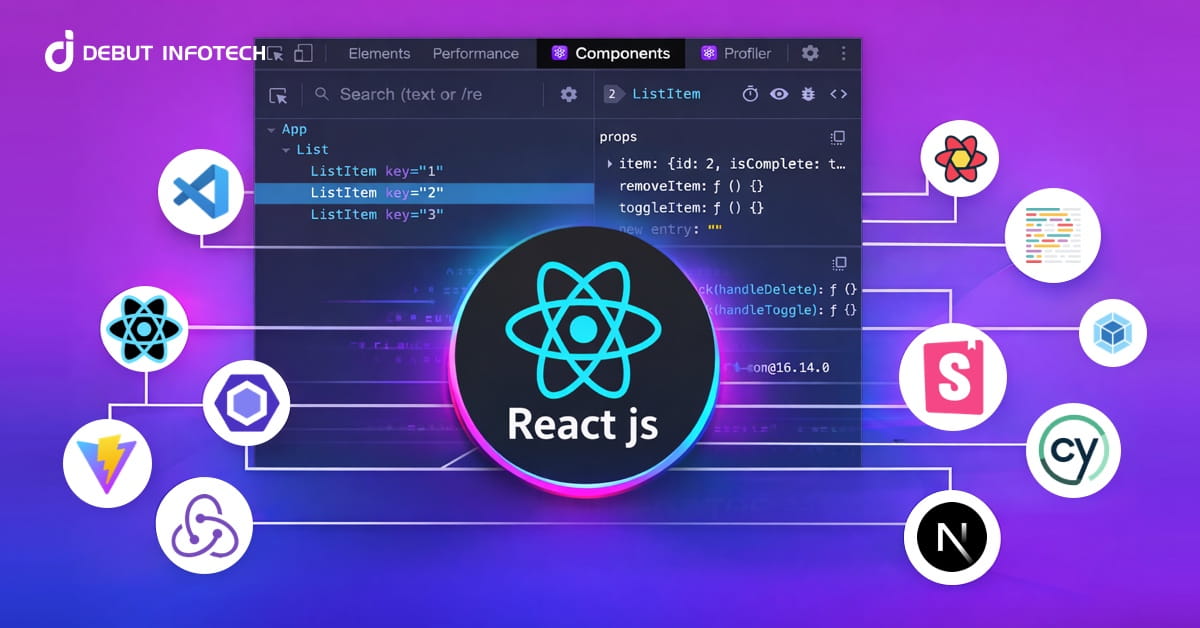
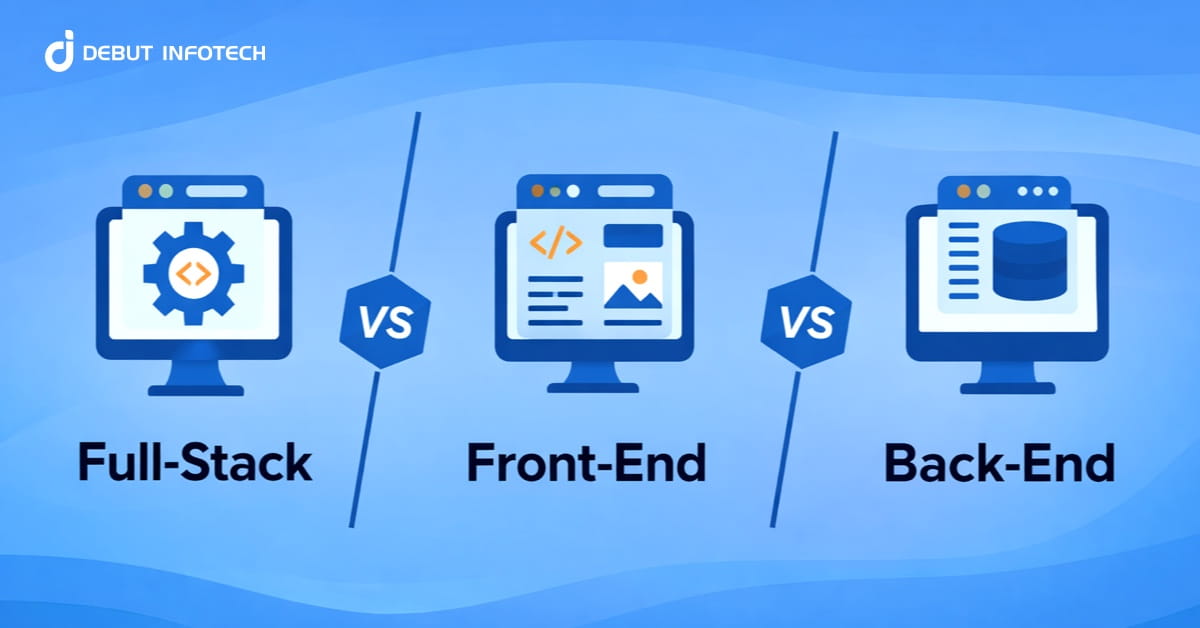
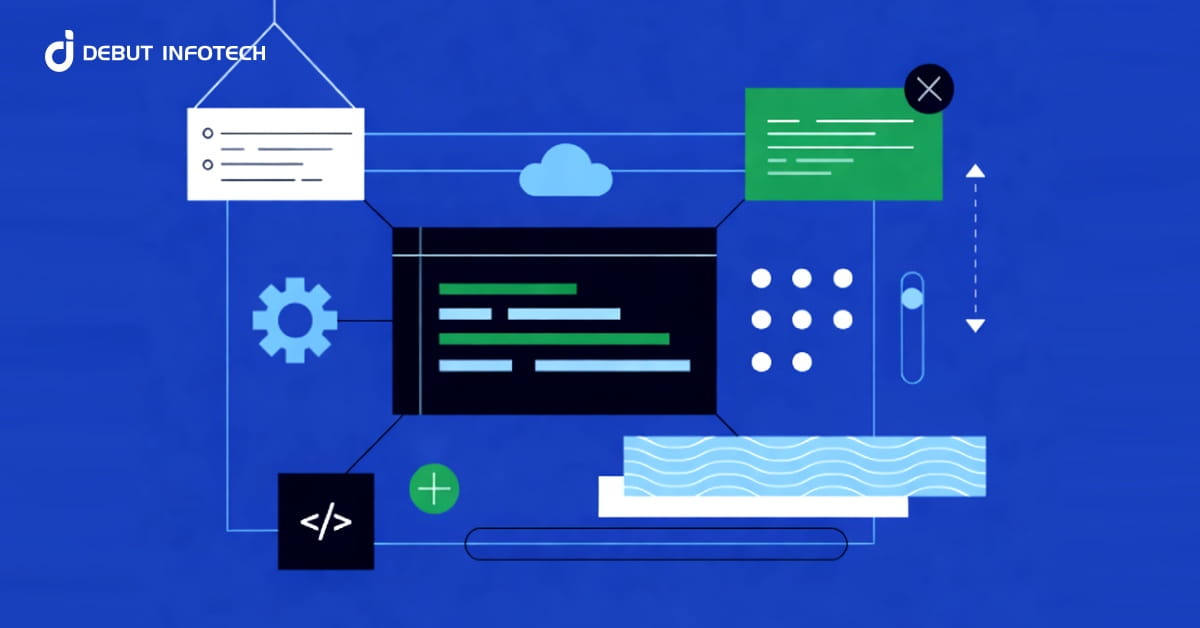
Leave a Comment